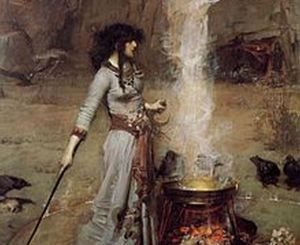Editors and other supervisors of the accused persons might also face disciplinary action, but the nature of that action is left to the discretion of the judiciary.
 Ramallah, October 29 – The official Palestinian news agency Ma’an found itself on the receiving end of sorcery accusations today, following several weeks of instances in which the agency’s reporters created witnesses out of thin air to dispute Israeli reports of Palestinian attacks on Jews.
Ramallah, October 29 – The official Palestinian news agency Ma’an found itself on the receiving end of sorcery accusations today, following several weeks of instances in which the agency’s reporters created witnesses out of thin air to dispute Israeli reports of Palestinian attacks on Jews.
Prosecutors at the Palestine Office of Public Enforcement confirmed today (Thursday) they are opening an investigation into Ma’an on possible charges of witchcraft. In dozens of cases over the last several weeks, the announcement said, Ma’an has cited numerous eyewitnesses who, apparently by magic, both saw events that video footage and other evidence do not corroborate, and denied the willing participation of Palestinians in any stabbings or other attacks.
Prosecutor Salem Salem detaled for reporters fifteen sample incidents over the last week alone in which Ma’an cited “witnesses” who saw Israeli forces “plant” a knife on or near the body of each neutralized attacker, or who saw Israelis attack or harass the accused attacker before the latter reacted. In every case, said Salem, “We have been unable to confirm the existence of these witnesses through normal human channels, leading us to suspect that Ma’an has conjured those people when reporting on the events, an act that violates our criminal code.”
While Palestinian criminal law is not specifically Islamic, many Islamic sensibilities are incorporated in to the code, among them the ban on all forms of magic. If convicted, the relevant journalists may face penalties as severe as execution, although some legal experts acknowledge the mitigating circumstances of maintaining the national Palestinian image of absolute victimhood vis-à-vis Israel. Editors and other supervisors of the accused persons might also face disciplinary action, but the nature of that action is left to the discretion of the judiciary.
“As in many societies in this part of the world, suspicion of witchcraft persists, regardless of scientific advancement,” explained Palestinian legal analyst Intouan Noot. “So the legal code reflects those social mores. Where we have progressed to some degree is the use of formal authority to enforce those mores, as opposed to a more lawless treatment of social violations that sometimes occurs. For example, when dozens of youths up and decide to try stabbing Jews, without a formal declaration of official policy, merely the constant encouragement and idolization of such actions by official organs of government,” he said, referring to the posters, video clips, and other media produced and promoted by Palestinian Authority figures and groups. Here, noted Noot, the tension between the need to stamp out the evils of witchcraft and the need to stamp out any notion that a Jew may have been in the right come into conflict, and the courts may take that as grounds for leniency.
Noot pointed to earlier cases that illuminates the legal conundrum, in which Palestinian projectiles were mysteriously transformed into Israeli bullets upon penetration into the bodies of Palestinian children. In those cases, however, the investigations were inconclusive, as no specific party was named as having performed the sorcery.




